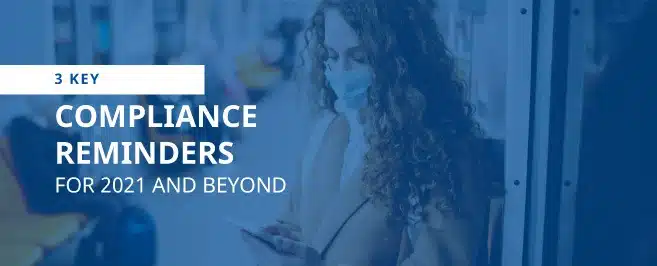3 Key Compliance Reminders for 2021 and Beyond


Full Platform Overview Chat With Us



Full Platform Overview Chat With Us




Though the COVID-19 pandemic has put a lot of life on hold, your nonprofit hasn’t stopped operating. You and your staff have worked tirelessly to keep your organization afloat through 2020 and 2021, fundraising for your cause and maintaining good relationships with donors.
And, with a few exceptions, the government hasn’t stopped expecting nonprofits to adhere to its rules, either. With that in mind, now is the perfect time for you and your team to review what’s required to operate in different states.
Compliance is fairly straightforward on the federal level, but according to Labyrinth’s overview on state filing requirements, processes at the state level vary and can change quickly. Plus, if you’re already fundraising in multiple states or just starting to expand your outreach to a new state, you have to juggle different rules, which can be confusing.
While achieving compliance can be a frustrating and time-consuming process, it’s not one that you can overlook or avoid. There are major penalties for non-compliant nonprofits, ranging from late filing fees to revocation of your nonprofit status. Or, worse yet, criminal or civil charges.
The good news is that we at Labyrinth are here to help. We highly recommend reaching out to an expert to be sure your organization is compliant with both state and federal regulations. But, understanding the importance and compliance information yourself can only help. In this post, we’ll remind you of three key areas of compliance that you need to focus on in 2021:
If you’ve expanded your nonprofit’s reach over the course of 2020 or are planning to do so soon, multi-state registration and other compliance requirements need to be a top priority.
Here are the big-picture compliance essentials to keep in mind:
Additionally, if you’re required to register to do business in a state, you’ll also need to appoint a registered agent there. A registered agent resides in or works in that particular state, and they’re listed as your organization’s representative to receive tax and legal documents on your behalf.
Many nonprofits opt to go through a commercial registered agent service that provides a registered agent for you. We highly recommend commercial registered agent services, as your registered agent will be a qualified and reliable person who is familiar with the requirements of the state you’re working within.
With opportunities to meet with supporters in person appearing on the horizon, your team has likely been re-evaluating your fundraising software, brainstorming new ideas, and maybe even started to plan some events.
However, as your nonprofit begins fundraising across multiple states, there are a few things to take into consideration, especially because of the myriad of responses states have had to COVID-19 concerns.
First, as mentioned in the previous section, you’ll want to ensure that you can legally collect donations from the residents of the state you’re working in. Second, pay attention to specific state and local COVID-19 guidelines. Once you know what’s required of you in the area in which you’re working, plan to:
These considerations are important because the last thing you want to do right now is create an opportunity for someone to contract the virus, especially when the focus should be on your cause. In addition to following local guidelines, you might also want to consider liability protection for your nonprofit, like requiring a virtual waiver for your next event.
According to Labyrinth’s list of fundraising requirements to know, you’ll also need to make sure you’re following state and municipal guidelines for:
The truth is that even now, in-person fundraising events are tricky. You may consider hosting virtual or hybrid events instead. If you do decide to throw in-person events, make sure you’re following the rules.
You most likely have ongoing virtual fundraising campaigns—whether that’s because of COVID-19 or because online fundraising is just a regular aspect of your nonprofit’s strategy.
There are also state regulations around online donations that you’ll need to consider. Even if you don’t physically operate in a state but you accept online donations from donors in that state, you may be required to register there. Most states do not have specific laws covering online fundraising, making online fundraising compliance a grey area in most places.
To fully cover your bases, register in the states that do have explicit laws covering online fundraising and solicitation registration. If the filing fees are infeasible for your organization, another option is to include a disclosure on your donation forms that specifies where you can accept donations from. This signals that you’re registered where you need to be and that you recognize the rule about soliciting online donations.
Get your compliance registration done right the first time so you’ll avoid roadblocks in multi-state operations and keep your nonprofit healthy and operating for the cause you care about. By following these compliance reminders, you’ll be able to ensure that you can spread your mission far and wide in 2021 and beyond.


Comments